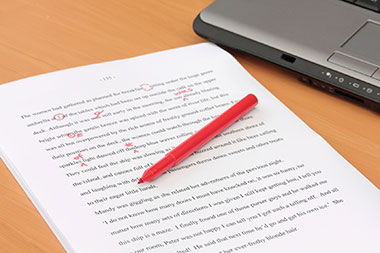 Have you ever sat down in front of a blank page, put your fingers to the keys, and then . . . nothing? Of course you have. Writer’s block is so ubiquitous that It’s become late-night entertainment show fodder. But all the SNL skits in the world aren’t going to do you much good when there’s a deadline around the corner and your brain won’t push past the opening line.
Have you ever sat down in front of a blank page, put your fingers to the keys, and then . . . nothing? Of course you have. Writer’s block is so ubiquitous that It’s become late-night entertainment show fodder. But all the SNL skits in the world aren’t going to do you much good when there’s a deadline around the corner and your brain won’t push past the opening line.
What about when you’ve got a good thing going already, but get stuck partway through? The 70+ half-finished drafts (gulp) in my blogging folder suggest that this is a bigger problem?at least for me. I’ll be cruising along, typing however many words a minute my kinda-sorta-but-not-really ten-finger typing can put on the page. Then there will be a blip in my creativity stream and I’ll waste time and altitude trying to sort out which word would be the best choice or how to end that paragraph.
Inevitably I’ll become so stuck that I’ll either spend twice as long as necessary on the written piece or I’ll get up and walk away?but never come back.
The solution to both problems is this: just write something. That sounds simple, but of course It’s one of those things That’s a lot more difficult in practice.
Why? One of our problems is that we often self-edit as we write. Yet this is one thing that most creativity experts will warn us against, since it slows down and even interrupts our thought process. It’s impossible to keep a smooth flow of words and ideas if we’re constantly reviewing and picking at what we just put down on the page. Sure, It’s not perfect?but It’s not supposed to be, not yet.
Letting thoughts flow without worrying about perfection is a hard habit to establish, but It’s necessary if we want to be productive writers. When I find myself falling into a pattern of editing as I go, I have to force myself to move ahead, even if I can’t think of the perfect word. I’ll put in a note (?INSERT RANDOM WORD HERE?) or finish a sentence with ?BLAHBLAHBLAH,? highlight the issue, and move on. The highlighting’s important so that I don’t miss the problem on my second go-around.
Then I work time into my schedule to come back for a second look, and invariably the solution to the problem will jump out at me. If I’d tried to solve it the preceding day, it would have taken me hours.
Prolific writing is not a guarantee of good writing, but steady writing is the only way you’ll practice enough to get anywhere near perfect. And making a habit out of a second edit is a good idea even if you didn’t experience writer’s block, since it gives an additional opportunity to catch errors and polish your work. By writing first and editing later you can stave off writer’s block and produce a more polished bit of writing.
Now That’s something to write home about!


